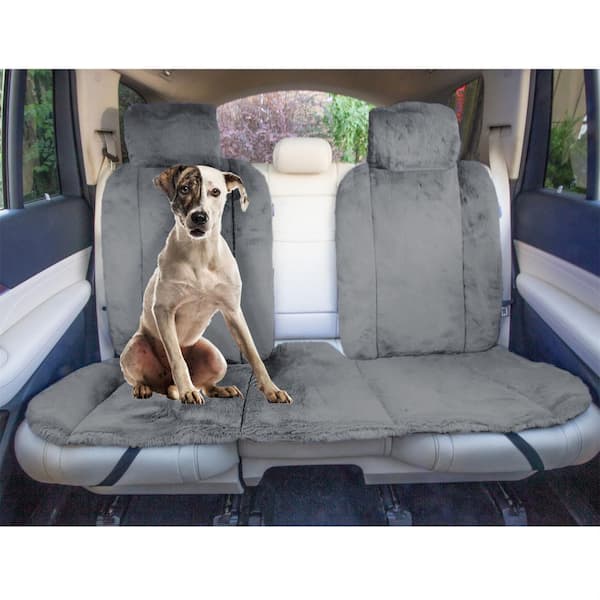Revolutionary Antimicrobial Car Seat Cushions
In today's fast-paced, germ-filled world, it's more important than ever to take steps to protect ourselves and our loved ones from harmful bacteria and viruses. One often-overlooked area that can harbor a wealth of germs is our car seats. Fortunately, there is a simple and effective solution: antimicrobial car seat cushions.
Antimicrobial car seat cushions are designed to inhibit the growth and spread of bacteria, viruses, and other harmful microorganisms. They are typically made from materials that are treated with antimicrobial agents, which may include silver ions, copper ions, or quaternary ammonium compounds. These agents work by disrupting the cell walls of microorganisms, preventing them from reproducing and spreading.
Protecting Your Health: Antimicrobial Car Seat Cushions

Installing an antimicrobial car seat cushion has a number of potential benefits, including:
- Reduced risk of illness: By inhibiting the growth of bacteria and viruses, antimicrobial cushions can help to reduce the risk of illness for both drivers and passengers. This is especially important for people who have compromised immune systems or who are frequently exposed to sick people.
- Improved air quality: Antimicrobial cushions can also help to improve air quality in your car by reducing the number of airborne bacteria and viruses. This can be beneficial for people who suffer from allergies or asthma.
- Easy to clean: Antimicrobial cushions are typically easy to clean and maintain, making them a convenient option for busy individuals and families.
- Long-lasting protection: The antimicrobial properties of these cushions can last for extended periods of time, providing continuous protection against harmful microorganisms.
The Benefits of Antimicrobial Car Seat Cushions

In addition to protecting your health, there are several other benefits to using an antimicrobial car seat cushion. These include:
- Comfort: Most antimicrobial cushions are designed with comfort in mind, providing extra cushioning and support for long car rides.
- Odor control: The antimicrobial agents in these cushions can also help to control unpleasant odors caused by bacteria and other microorganisms.
- Stain resistance: Many antimicrobial cushions are also treated with a stain-resistant coating, making them easier to clean and maintain.
- All-around protection: Antimicrobial car seat cushions not only protect against bacteria and viruses, but they can also inhibit the growth of other harmful microorganisms such as mold and mildew.
Maintaining a Clean and Healthy Car with Antimicrobial Cushions

Our cars can quickly become breeding grounds for bacteria and viruses, especially if we frequently have passengers or transport children who may not always have clean hands. Antimicrobial car seat cushions provide an added layer of protection, ensuring that your car remains clean and healthy for you and your loved ones.
However, it's important to remember that antimicrobial cushions are not a substitute for regular cleaning and hygiene practices. Here are some tips for maintaining a clean and healthy car when using antimicrobial cushions:
- Regularly vacuum and wipe down your car seats to remove any debris or dirt that may accumulate.
- If possible, use a disinfectant spray or cloth to wipe down your car seats and cushions, paying extra attention to areas where bacteria and viruses are likely to thrive, such as armrests and headrests.
- Avoid eating or drinking in your car, as this can lead to a buildup of food particles and spills that can attract bacteria and promote their growth.
- Wash your hands before and after driving, especially if you have been in contact with sick individuals.
- If you have children, teach them the importance of washing their hands before getting into the car to prevent the spread of germs.
Following these simple steps in addition to using antimicrobial car seat cushions can help to maintain a clean and healthy car environment.
Choosing the Right Antimicrobial Car Seat Cushion
When it comes to choosing the right antimicrobial car seat cushion, there are a few factors to consider. These include:
- Material: Most antimicrobial cushions are made from materials such as memory foam, gel, or polyester. Consider which material would be most comfortable for you and your passengers.
- Size and fit: Make sure to choose a cushion that is the appropriate size and shape for your car seats to ensure a comfortable fit.
- Antimicrobial agent: Different cushions may use different types of antimicrobial agents. Do some research to determine which one would be most effective for your needs.
- Brand reputation: It's important to choose a reputable brand when purchasing an antimicrobial cushion to ensure that the product has been properly tested and is safe for use.
- Warranty: Some brands offer warranties on their products, which can provide added peace of mind and protection for your investment.
The Science Behind Antimicrobial Cushions

Antimicrobial car seat cushions may seem like a new and innovative product, but the science behind them has been around for centuries. For example, silver has long been known for its antimicrobial properties, and was used by ancient civilizations to prevent spoilage of food and beverages. Today, modern technology has allowed us to harness these properties in a more convenient and effective way.
The antimicrobial agents used in these cushions work by disrupting the cell walls of bacteria and other microorganisms, preventing them from reproducing and spreading. This helps to keep the levels of these harmful germs at bay, reducing the risk of illness and promoting overall health.
How Antimicrobial Cushions Inhibit Microbial Growth
There are several ways in which antimicrobial cushions can inhibit microbial growth. These include:
- Damage to cell membranes: The antimicrobial agents in these cushions can penetrate the cell walls of bacteria and viruses, causing structural damage and preventing them from functioning properly.
- Inhibition of enzymes: Some antimicrobial agents work by inhibiting the enzymes that bacteria and viruses use to survive and reproduce.
- Disruption of cellular respiration: Certain antimicrobial agents can interfere with the process of cellular respiration, which is essential for the survival of microorganisms.
- Prevention of biofilm formation: Biofilms are layers of bacteria that form on surfaces, making them difficult to remove. Antimicrobial agents can prevent the formation of biofilms, making it easier to keep surfaces clean.
The Importance of Antimicrobial Car Seat Cushions for Families
Families, especially those with young children, may benefit greatly from using antimicrobial car seat cushions. Children often have weaker immune systems and are more susceptible to illnesses, making it important to take extra precautions to protect their health.
In addition, families tend to spend a lot of time in their cars, whether it's commuting to work or running errands. This increased exposure to germs and bacteria makes it even more crucial to have an added layer of protection in the form of antimicrobial cushions.
Furthermore, families with children may find that their car seats get dirty and stained more easily. The stain-resistant properties of many antimicrobial cushions can help to keep car seats looking cleaner for longer, saving parents the hassle of constantly cleaning and replacing cushions.
Maintaining Your Antimicrobial Car Seat Cushion
To ensure that your antimicrobial car seat cushion continues to provide the maximum amount of protection, it's important to maintain it properly. Here are some tips for maintaining your cushion:
- Follow the manufacturer's instructions for cleaning and care. Most cushions can be wiped down with a damp cloth or washed with mild soap and water.
- Avoid using harsh chemicals or cleaners on the cushion, as this can damage the antimicrobial properties.
- If your cushion starts to lose its effectiveness, consider replacing it with a new one. The lifespan of antimicrobial cushions can vary depending on the brand and usage.
- Store your cushion in a cool, dry place when not in use to prevent bacteria and mold from growing.
Frequently Asked Questions About Antimicrobial Car Seat Cushions
- Is it safe to use an antimicrobial car seat cushion?
Yes, these cushions have been extensively tested and found to be safe for use by adults and children.
- Can I use an antimicrobial cushion on any type of car seat?
Most antimicrobial cushions are designed to fit a variety of car seats. However, it's always best to check the dimensions and shape of the cushion before purchasing.
- How often should I clean my antimicrobial cushion?
It's recommended to clean your cushion at least once a month, or more frequently if it becomes visibly dirty.
- Can I still use disinfectant sprays or wipes on my antimicrobial cushion?
Yes, you can use these products in addition to regular cleaning methods to further disinfect your cushion.
- Will an antimicrobial cushion eliminate all germs from my car seat?
While these cushions can greatly reduce the amount of bacteria and viruses on your car seat, they cannot eliminate all germs. It's important to continue practicing good hygiene and cleaning habits.
Conclusion
In today's world, where we are constantly exposed to germs and harmful microorganisms, it's crucial to take steps to protect our health and the health of our loved ones. Antimicrobial car seat cushions offer a simple and effective solution to reducing the risk of illness and maintaining a clean and healthy car environment. By understanding the science behind these cushions and following proper maintenance and cleaning practices, we can ensure that our cars remain a safe and comfortable space for ourselves and our families. Choose an antimicrobial car seat cushion today and experience the benefits for yourself!



